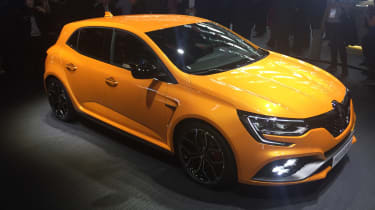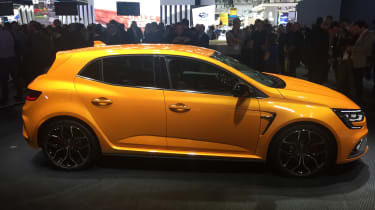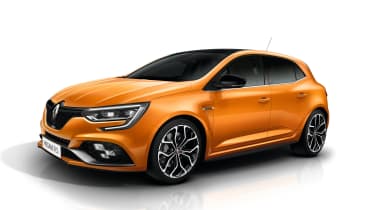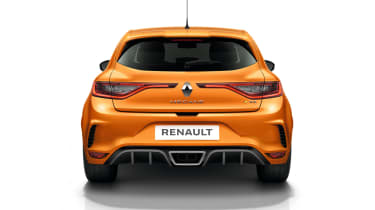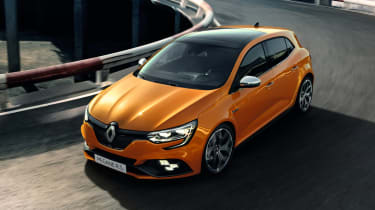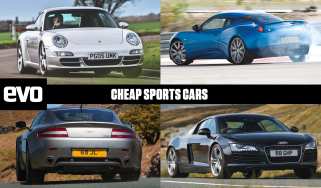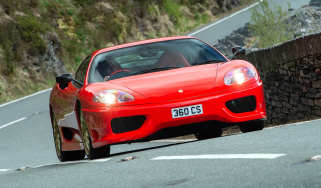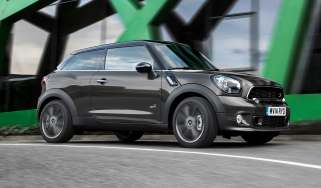New 2018 Renault Megane R.S. UK prices announced - undercuts most major rivals
Priced at £27,495, the new Megane R.S. undercuts most major rivals, but the Cup chassis costs an extra £1500
Renault has revealed UK prices of the next-generation Megane Renault Sport and at £27,495, it undercuts most major rivals, but there is a caveat. The desirable Cup Chassis is a no-cost option for the Megane’s first month on sale, after which it will cost a further £1500 on top of the asking price. That will place the new Megane R.S. with Cup Chassis above rivals like the Hyundai i30 N Performance Pack and Peugeot 308 GTi by Peugeot Sport. The optional EDC dual-clutch gearbox is a further £1700.
A more powerful Trophy model, featuring a 296bhp power output, will be available later in the year, although further details of that version have yet to be released.
> 2018 Renault Megane R.S. first drive review
A key underlying theme of the new Megane R.S. is one of cutting-edge technology; four-wheel steering, hydraulic bump stops for the suspension and the Renault Sport Monitor system are all firsts in the hot hatch field set to be fitted to the car.
All versions of the car draw power from a 1.8-litre turbo four-cylinder engine, also found in the Alpine A110 sports car. The standard car produces 276bhp and 288lb ft of torque – 20bhp and 7lb ft of torque less than the Trophy model. Against the hot hatch competition, the Megane looks a little light on power, the Honda Civic Type R, Ford Focus RS and VW Golf R develop in excess of 305bhp.
Technical highlights include a cylinder head that’s been designed in cooperation with Renault’s Formula One squad, plus the adoption of a new, faster acting twin scroll turbo. The engine also gets the same mirror bore coating that’s used in the Nissan GT-R, while there’s also a higher capacity, dual intake air filter.
At the other end of the car is a neat exhaust system that aims to blend refinement with a sporty soundtrack without resorting to complicated electrically actuated flaps. Instead there’s cleverly designed back box that delivers a muted burble at idle, yet as engine speeds rise the change in pressure causes the gases to bypass the longer silencer tube and head straight for the exit pipe, essentially creating a louder straight-through set-up.
One shouldn't get too hung up on the numbers though, some of evo’s greatest drives have been behind the wheel of Renault Sport cars that looked underpowered on paper but proved to be anything but on the road. That and the Megane’s technical armoury should compensate for any power-based deficiencies. The four-wheel steering 4CONTROL system is a revised iteration of the one employed by the Megane GT: faster and more precise it's been paired with an upgraded PerfoHub front axle (used on the old car) to maximise the benefits.
Discussing the merits of 4CONTROL, chassis engineer, Antoine Frey said steering response is 20 percent faster than the old RS. While the engineers have been keen to integrate new technology, they’ve ensured it’s been done as organically as possible to retain the pointy, nose-led feel of Renault Sport with Frey revealing that, ‘with this new system you shouldn’t be able to tell that the car has four-wheel steering.’ As with the normal 4CONTROL set-up, the rear wheels turn in the opposite direction to the fronts and lower speeds to increase agility, before pointing the same way as the fronts to boost high-speed agility and stability. The 4CONTROL set-up has also allowed Frey and his team to increase the anti-roll stiffness at the rear without any compromise in ride comfort.
As before the Megane gets a six-speed manual gearbox as standard. In fact, it’s exactly the same transmission as the old car’s, with the same gear set. However, there’s now the option of a six-speed EDC twin-clutch set-up for the first time. This set-up is different to that used in the Clio, as it features a double wet clutches and hydraulic actuators, which combine to deliver shifts that are claimed to be faster and smoother. And while its heavier than the manual transmission, engineers claim the weight penalty is offset by greater efficiency and fractionally quicker acceleration off the line – the launch control equipped EDC should crack 0-62mph in under six seconds.
With the two pedal models, drivers get a choice of four shift strategies – Comfort, Natural, Sport and Race. Each ramps up the speed of shifts, while in race the transmission will hold ratios, only changing up or down when instructed by the steering column-mounted paddles. The same driver modes (plus Perso, which allows you to mix and match your favourite settings) alter the steering weight and throttle response while also loosening the stability controls grip on proceedings.
After numerous teasing parades under disguise, we finally glimpsed the hot hatch in the flesh at the 2017 Frankfurt Motor Show. Based on the five-door bodystyle (there’s no three-door option) it sits square, wearing blistered wheel arches protruding 60mm and 45mm further from the body than the standard car at the front and rear respectively, making for an altogether aggressive appearance. From behind, the centre exit exhaust and motorsport aping diffuser support the angrier aesthetic, the latter contributing to aero gains – both lift and drag have been reduced over the old car.
All versions of the Megane get the hydraulic bump stops as standard. ‘These aren’t the same as those on the Clio 200’, explained Frey. ‘With the Megane’s system we can tune the stroke and maximum load.’
More importantly, the combination of the new bump stops and four-wheel steering means the Megane does without the adaptive dampers that many rival models use. This more straightforward, analogue approach has been taken with the limited slip differential, which is a wholly mechanical Torsen type (the old car had a simpler GKN item), which can send up to 45 percent of the engine’s torque to a slipping wheel. As Frey points out: ‘We didn’t use and electronically controlled unit because we were happy with the set-up off the front axle. Also, with the 4CONTROL already included we didn’t want too much tech.’
The limited slip diff is an option that can be specified with the Cup chassis, which also brings 10 percent stiffer springs and larger 19-inch alloys that are wrapped in 245/35 19 Bridgestone tyres – the standard versions get 235/40 18 Continentals. Another option for the Cup are the new cast iron and aluminium composite front discs, which result in a total saving of 3.6kg in unsprung mass. As with the standard set-up, these discs feature 355mm diameter and are clamped by Brembo calipers.
Another area of the car that’s benefitted from a thorough overhaul is the RS Monitor, which allows drivers to access data from their driving. As with the Clio you can see real-time performance data on the large 8.7-inch R-Link 2 infotainment screen, but the Megane takes the system a stage further with a number if new features. For starters, you can hook a dashcam or smartphone up to the RS Monitor and film laps on a track, which you can download and watch later. There’s also the RS Replay function, which allows drivers to share their video and data on social media with other RS owners.
